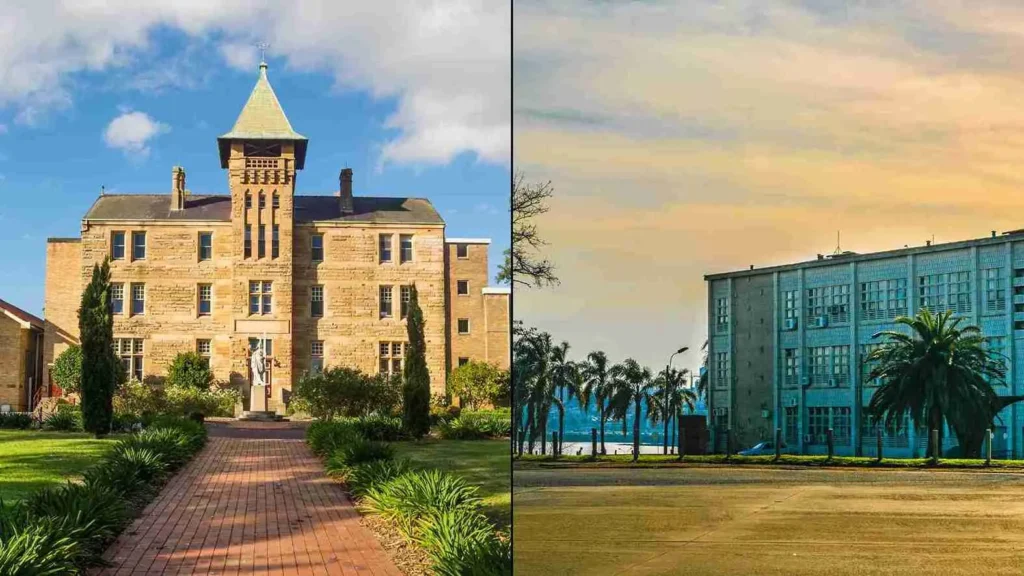The main difference between private and public schools is that private schools are privately owned and funded without assistance from local, state, or federal governments. Families pay tuition to attend private school. Depending on the private school, tuition can range from hundreds to tens of thousands of dollars per year. Public schools cost nothing for students to attend and are funded by the government.
The Government Involvement
Public schools are required to administer state and federal assessments because they receive funding from these governments to keep their schools running. These assessment results also help schools get additional funds for support they may need, such as paraprofessional help, additional curriculum, or other government aid.
- The government has less power over the day-to-day administration of private schools than public schools because private schools are not funded by taxpayer money. This removes many state requirements from private schools that public schools must adhere to.
- Much of what is taught in public schools is mandated by the state, but private schools are not under state control and have greater flexibility when it comes to what they offer and what standards they set.
- Also, public schools must use the often-dreaded state-mandated standardized tests to assess learning, while private schools can choose to use the state tests or create their own.
- Even while it is against the law for public schools to provide specific religious instruction, many private schools are built on the belief that religion should be a part of each child’s education. If you would like to teach in a private school that supports one specific religion, you can choose to do so. In a public school, you must keep your religious beliefs out of the classroom.

Since private schools don’t have to follow state guidelines, they don’t have to administer any summative assessments mandated by the state or federal governments. This can make it challenging for parents when they’re trying to consider which school to choose for their children because they don’t have any test scores to compare to public schools. This doesn’t mean that private schools don’t use tests, however. They are free to use any assessment they think fits their curriculum, students, and school.
Teaching Curriculums
- Public School
You must teach according to a government-approved curriculum. At some levels, this will also involve preparing your students for exams that could help define their futures.
Overall this will mean that you might not have much freedom in terms of what you teach.
- Private School
After reading about the different types of private schools, you will notice they can get pretty specific, so it follows that the teaching can get pretty specific, too.
If you’re a teacher with a niche or if you are looking to develop one, private school teaching might be the best way to become an expert in your specialty. Whether that is working with kids with special needs, teaching the flute, or working with bilingual students.
There are still some private schools that adhere closely to the standard curriculum. But most private schools offer their teachers more freedom to decide what and how they teach than public schools.
Private schools also often have smaller classes than public schools, making it easier for teachers to monitor and support students’ learning on an individual level.
- In the United States, education is provided in public and private schools and by individuals through homeschooling. State governments set overall educational standards, often mandate standardized tests for K–12 public school systems, and supervise, usually through a board of regents, state colleges, and universities.
- Private schools are free to determine their own curriculum and staffing policies. Voluntary accreditation is available through independent regional accreditation authorities, although some state regulations can apply.
Teacher Pay
Teacher salaries in private schools are based on student tuition. Because these schools charge different admissions prices, their teacher salaries can vary widely. Some private schools may pay much more than public schools, but most pay less.
The only big “negative” to teaching at a private school is the pay. On average, private school teachers make $10-15,000 less annually than public school teachers. However, there are numerous advantages to teaching at a private school, such as:
- Certification is sometimes not required
- Fewer incidents of violence and other bad or criminal behavior
- No government control over the school
- Smaller classes/more attention given to students
- Newer books and equipment
- More control over what is taught and how it is taught
- Complaints are more quickly addressed due to a smaller student body
- Teacher pay in private schools really depends on the school and location. On average, private school teachers work 180 days, which is also typical of public school teachers. Of course, there are teacher in-service days, after-school commitments, and other professional obligations that teachers are contracted to fulfill for both public and private schools.
The main difference between these obligations, however, is that public school teachers usually have a union that allows them to bargain for higher wages or pay when work goes over contracted hours. Private schools don’t typically have unions, which allows private school administration to incorporate extra work without pay.
Remember, private schools are businesses, and there are good and bad business managers out there. This could affect your salary and working conditions. Make sure you do your research before you sign up to work with any private school!
Look up online reviews and try to talk to as many teachers who work there as you can to get a realistic idea of what the working conditions and pay are truly like.
Class Size Matters
Private schools also often have smaller classes than public schools, making it easier for teachers to monitor and support students’ learning on an individual level. With smaller classrooms and student bodies usually come fewer discipline problems. Students with chronic behavior problems can be removed from a private school more easily than from a public school. Class sizes really depend on the type of school and how many teachers there are.
Public schools usually experience the backlash of having overcrowded classrooms. The response varies depending on the location and the funding available for teacher salaries.
Budget and Donations
- The government funds public schools and tuition.
- Donations fund private schools
Because of these budget constraints, private schools may not always be able to offer the extra support to students that public schools provide. This means having speech pathologists, counseling, and extended resource support, for example.
The same goes for public schools. If their funding can’t support extra programs, those programs will be cut. In some instances, public schools may not have music, art, or other fine arts classes.
What about Student Support?
- The law requires that private schools admit any student.
- Public schools are free to all students because American taxes pay for them.
Just because funding comes from taxes, this does not mean that every public school is funded at the same level. On the other hand, private schools can be, and usually are, selective about who they admit.
- By law, public schools are required to provide “a free appropriate education to eligible children with disabilities throughout the nation and ensure special education and related services to those children,” according to the Individuals With Disabilities Education Act (IDEA). Public schools offer student services throughout their entire educational career.
Private schools may not have the funds to provide these same supports, and they are not required by law to do so. They can even turn students away if they feel they aren’t a good fit for their school. However, there are still some private schools that specialize in instruction for students who need additional support. It’s important to figure out what services are offered before you jump in.
Teaching jobs can be found in both the public and private sectors, but most teachers generally apply for positions in one or the other. This is because the two are markedly contrasted, and new teachers tend to use these disparities to determine their best fit.
Diversity and Acceptance
- Public
The law requires public schools to admit all students without discrimination. Because of this, teachers in public schools tend to teach a diverse population of students in terms of race and ethnicity, socioeconomic status, levels of need, and more. If you value diversity, public schools might be for you.
- Private
Private schools are allowed to choose which students to admit. This generally means that they put their applicants through admissions processes, which often include interviews, and grant admission quite selectively based on their school values.
Private schools also charge tuition, which means that they are primarily attended by students from wealthy families, with the exception of students who demonstrate enough financial need to receive scholarships. Upper-class, white students and teachers comprise the majority of most private school populations.
Resources
Resource availability represents perhaps the biggest difference between the public and private school sectors.
- Public schools
Public schools are tax-funded, but different districts receive different levels of funding. This means that the resources available to you will depend on the specific school in which you teach. Public school funding tends to be consistent with the financial resources of the surrounding community.
- Private schools
The price of attendance often becomes a factor in determining the socioeconomic makeup of the student body, although some private schools offer scholarships to students with demonstrated financial need. Because of limited funds and a lack of mandates, teachers encounter fewer special needs students in private schools than in public schools, so if you specialize in special education, you might not find many available positions in the private sector.
Parental Involvement
Teaching takes a village, but there are major contrasts between public and private schools when it comes to family communication.
- Public
The degree to which parents and families of students in public schools engage in their children’s education is entirely dependent on a school’s community and population.
In some public schools, student families are privileged with enough time and money to attend events and meetings and even volunteer regularly. In other public schools, families do not have the option of taking time off of work, lack transportation, or cannot afford babysitters to watch younger children when they come to school.
- Private
Private schools naturally see parents who are more involved in their student’s lives because it takes more effort to get students into private schools in the first place. Wealthy families with time to spare are likely to give their time to education. With greater parental involvement, private school teachers often feel well-supported.
Teaching Qualifications
Teaching jobs can be found in both the public and private sectors, but most teachers generally apply for positions in one or the other. This is because the two are markedly contrasted, and new teachers tend to use these disparities to determine their best fit.
- Requirements in Public School
National or local governments will normally require teachers to have specific qualifications in order to work in public schools.
The required qualifications will vary from place to place so make sure you double-check that any qualification you sign up for will be accepted in the school district you want to teach in.
Making sure you get the right qualifications will open up job opportunities in a whole network of schools that could stretch throughout your state, country, and even overseas.
- Requirements in Private School
As the teaching you do in private schools can vary, all kinds of qualifications might help you work in one.
- A teaching license may be required to work in an international school or a boarding school, for example.
- To work in a language school as an English teacher, you need a TEFL certification.
In some cases, private schools also have the authority to hire teachers based on experience alone, so you may not need qualifications at all!
A good place to start is by researching the kind of teaching you want to do and examining what schools in that sector ask of their teachers.
Job Security
- Security in a Public School
Public school teaching jobs are normally very secure because taxpayers fund them. Instead of working for a private employer, you’ll be working for the government and your local community.
You will get to enjoy all the job protection that comes with that!
In addition, public school teachers often have strong unions that can offer advice and support if they ever run into difficulties at work. As a public school teacher, you can be pretty confident that you are part of a standardized system where workers’ rights are well-protected.
- Security in Private School
In private school settings, job security is less than in public schools. However, if you have a good performance track record, there is a low risk of your job being damaged.
It all depends on your personal preferences, as it can cause some stress for those who enjoy the guarantee of long-term security.
Deciding The Right Way for You
Still not sure where you would be better suited? Well, the good news is there’s nothing to say that you can’t do both!
- There are plenty of TEFL teachers who work abroad in private schools and then return home to get qualified to work in public schools.
- There are also plenty of public school teachers who get itchy feet and decide to take their career overseas by teaching in private TEFL academies or international schools.
You might also find that hopping between public and private school systems helps you advance your career by allowing you to pick up new skills and apply for new positions and promotions.
So, keep an Open Mind!
Disclosure: This information is for educational purposes only and should not be construed as financial advice. Please consult with a qualified financial advisor before making any investment decisions.

About Author
Bill Wallace blends his academic background in Literature with his ventures in International Business and finance. His professional journey took him across Europe, especially in Spain, where his passion for writing evolved. Since then, armed with his literary finesse and investment acumen, he has been crafting financial content for teachers worldwide. More about me.
Similar Read:





